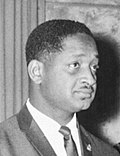| |||||||||||||||||||||||||||||||||||||||||||||||
14 seats in the Legislative Council 8 seats needed for a majority | |||||||||||||||||||||||||||||||||||||||||||||||
|---|---|---|---|---|---|---|---|---|---|---|---|---|---|---|---|---|---|---|---|---|---|---|---|---|---|---|---|---|---|---|---|---|---|---|---|---|---|---|---|---|---|---|---|---|---|---|---|
| Registered | 212,518 | ||||||||||||||||||||||||||||||||||||||||||||||
| Turnout | 55.79% | ||||||||||||||||||||||||||||||||||||||||||||||
| |||||||||||||||||||||||||||||||||||||||||||||||
| |||||||||||||||||||||||||||||||||||||||||||||||
 |
|---|
| Constitution |
General elections were held in British Guiana on 12 August 1957. [1] The result was a victory for the faction of the People's Progressive Party led by Cheddi Jagan, who remained Prime Minister. [2]


